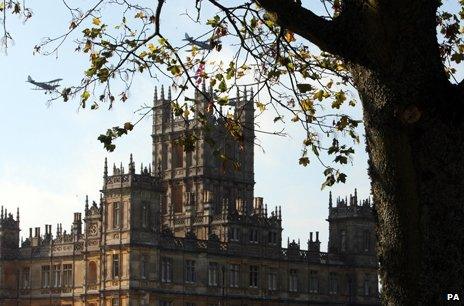Lady Mary needn't worry - Britain's elite will survive
- Published
- comments

Lady Mary's deliciously vinegary put-down of civil servant Charles Blake in the latest episode of Downton Abbey hints at the political and economic change which threatened the existence of Britain's landed gentry in the early 20th Century.
He is an "intellectual" (dread word) who, on behalf of the government, is considering the future of large estates. Lady M is horrified to discover Charles is not there to help them survive.
But new research out today suggests inheritance laws and progressive taxation have actually done little to diminish the privilege and advantage of the ancient aristocracy.
According to the paper from the LSE, a study of surnames over the past 800 years reveals "it takes at least half a millennium for the UK's elite class to shake off their lineage and converge with the average members of society - at least 400 years slower than economists had earlier predicted".

Lord Grantham need not worry. He may have to let visitors into the drawing room on Saturdays. Some of the servants may be required to seek employment elsewhere. There may need to be giraffes in the grounds. But the advantages of aristocratic blood will ensure his offspring prosper.
The author of the LSE study, economic historian Dr Neil Cummins, says the class structure of English society is evolving far more slowly than previously believed.
"Just take the names of the Normans who conquered England nearly 1000 years ago. Surnames such as Baskerville, Darcy, Mandeville and Montgomery are still over-represented at Oxbridge and also among elite occupations such as medicine, law and politics," Dr Cummins says.
His paper asserts that social status is more strongly inherited than height, and social mobility in England in 2012 is little greater than in pre-industrial times.
"What is surprising is that between 1800 and 2011 there have been substantial institutional changes in England but no gain in rates of social mobility for society as a whole," he says.
The research is published on the same day as the Office for National Statistics (ONS) produces data on who is most likely to receive a fat inheritance in Britain. The answer is, unsurprisingly perhaps, people who are already very rich.
"Individuals living in households which already had the highest levels of wealth showed an increased chance of inheriting over individuals living within middle wealth households," the ONS research paper states.
You are more likely to inherit if you own your home outright (stately or otherwise), went to university and are self-employed or at managerial level in the workplace.
In the period 2008-10, there were inheritances worth a cool £75bn in Britain. The 20% largest legacies account for 76% of the total worth. In other words, as the ONS puts it, "the inheritances received by a small few had a disproportionately higher value than the majority".
So Lady Mary need not get quite so cross. The power, privilege and advantage of the elite will not be diminished by some dashing intellectual from Whitehall - not in this series anyway.